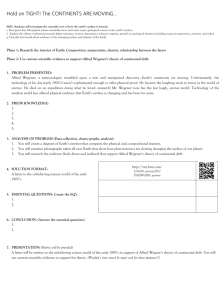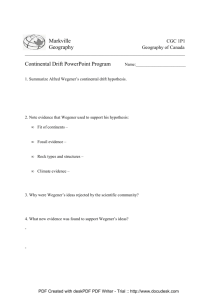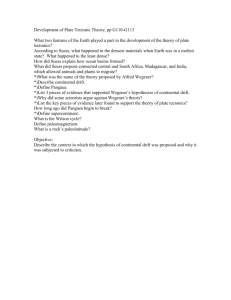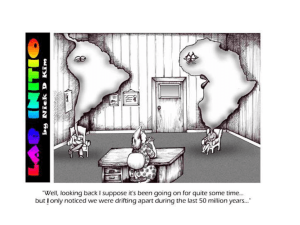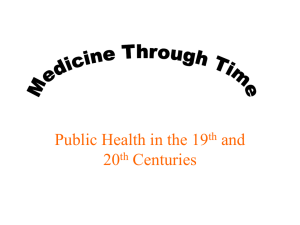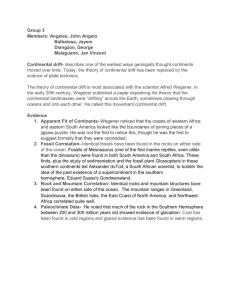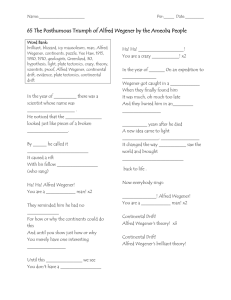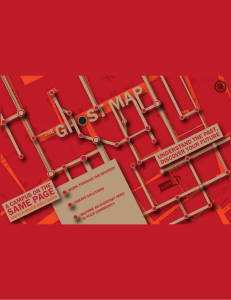PPT file - UCL Department of Geography
advertisement
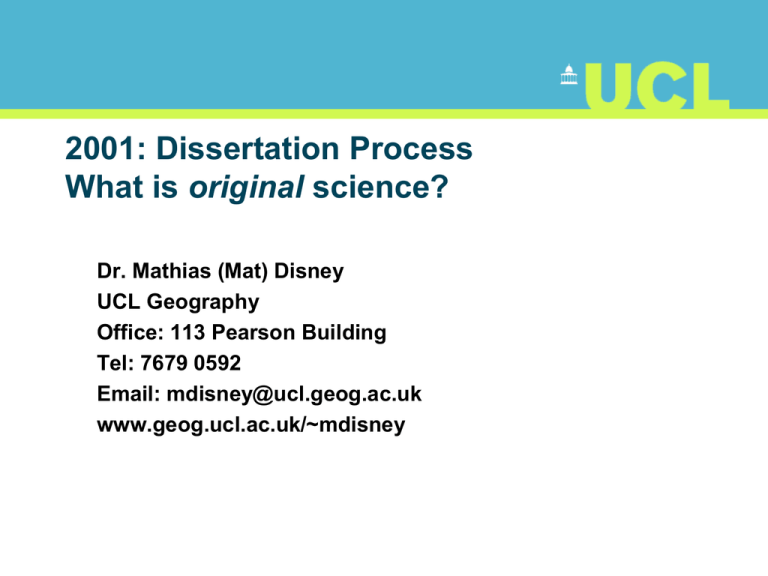
2001: Dissertation Process What is original science? Dr. Mathias (Mat) Disney UCL Geography Office: 113 Pearson Building Tel: 7679 0592 Email: mdisney@ucl.geog.ac.uk www.geog.ucl.ac.uk/~mdisney Overview • Learn by example(s)! “Big” science often serendipitous – – – – Cholera: John Snow Evolution: Darwin, Wallace Continental drift: Wegener Rising CO2: Keeling • But don’t overlook “small” science, incremental developments Cholera: John Snow, 1813-1858 • Cholera a major killer in early C19th – Pandemics across Europe (1832: 6000+ died London, 2000 in Paris; 1851: 14000 died London etc.) • Believed to be airborne – no understanding of mechanism • John Snow, young English doctor, plotted cholera deaths on a map • Showed deaths clustered around public water pumps Cholera: John Snow, 1813-1858 Cholera: John Snow, 1813-1858 • “On proceeding to the spot, I found that nearly all the deaths had taken place within a short distance of the [Broad Street] pump.…. • The result of the inquiry, then, is, that there has been no particular outbreak or prevalence of cholera in this part of London except among the persons who were in the habit of drinking the water of the above-mentioned pump well. • I had an interview with the Board of Guardians of St James's parish, on the evening of the 7th Sept, and represented the above circumstances to them. In consequence of what I said, the handle of the pump was removed on the following day.” Continental drift: Alfred Wegener (1880-1930) • Idea of how continents were formed around start of C20th Continental drift: Alfred Wegener • Similarity of geology and fossil fauna from S. America to W. Africa • “Land bridges” proposed to explain this • Wegener coined term “continental drift” in 1912 • Had no mechanism for it though….idea was dismissed (except by a few e.g. Holmes, du Toit etc) in 1920s and 30s…… • Until development of paleomagnetism in 1950, discovery of plate tectonics 1960s Evolution: Charles Darwin, Alfred Russel Wallace • How and why do species change? • Two men independently arrived at same idea at almost same time (1855-1858) – Evolution through natural selection Evolution: Charles Darwin, Alfred Russel Wallace • Both men’s ideas arose through observation of related species – Darwin’s famously of Galapagos finches on his voyage aboard the Beagle – Darwin’s ideas based around competition for survival between individuals within a species – Wallace emphasis on adaptation due to ecological pressure Rising atmospheric CO2: Charles Keeling 2 So….? • All these examples show: – Original science from simple observations – Often seemingly uninteresting measurements – What about “small” science, incremental advance? Science is original if….. • We apply an existing method in a different way – Taking model or theory already developed and applying it to a different set of observations • We apply an existing method in a different place – A theory that works in one place may not work in another – This can tell us something important! Science is original if….. • We modify an existing method – It didn’t work the way we expected, so change it slightly • We repeat existing work…. – Critically re-appraise work already done – Science must be replicable – If we don’t get same results, why? Tells us something Science is original if….. • We test an existing hypothesis, but in a different way – Maybe use different tools & methods to analyse data – Ask different questions to test hypothesis (use different observations) Recent examples http://www.nature.com/nature/journal/vaop/ncurrent/pdf/nature12914.pdf &see http://www.theguardian.com/environment/2014/jan/15/trees-grow-moreolder-carbon Recent examples http://www.pnas.org/content/110/3/E185.full.pdf+html?sid=7c972622-4c8d-4edc-8426-7f9ddd0df848 Recent examples He said….. We said….. http://www.pnas.org/content/110/3/E185.full.pdf+html?sid=7c972622-4c8d-4edc-8426-7f9ddd0df848 Recent examples http://www.sciencedirect.com/science/article/pii/S0034425711000873 Differences of opinion re ‘originality’ Reviewer 1: This is an excellent paper. The authors are to be congratulated on this interesting and exciting piece of work. I recommend publication and only have a few very minor comments that the authors may wish to consider. Reviewer 2: I found the paper weak to support the use of the authors' methods to assess real case scenarios, for improving current burned area algorithms and, even more so, for burn severity discrimination. http://www.sciencedirect.com/science/article/pii/S0034425711000873 Summary • Original science not always “big” science by any means • Most original science is small incremental advances in knowledge or understanding • Don’t be afraid to ask “stupid” questions! Recent examples http://www.nature.com/nature/journal/v481/n7381/pdf/nature10717.pdf Recent examples http://www.sciencemag.org/content/335/6065/214.full.pdf
